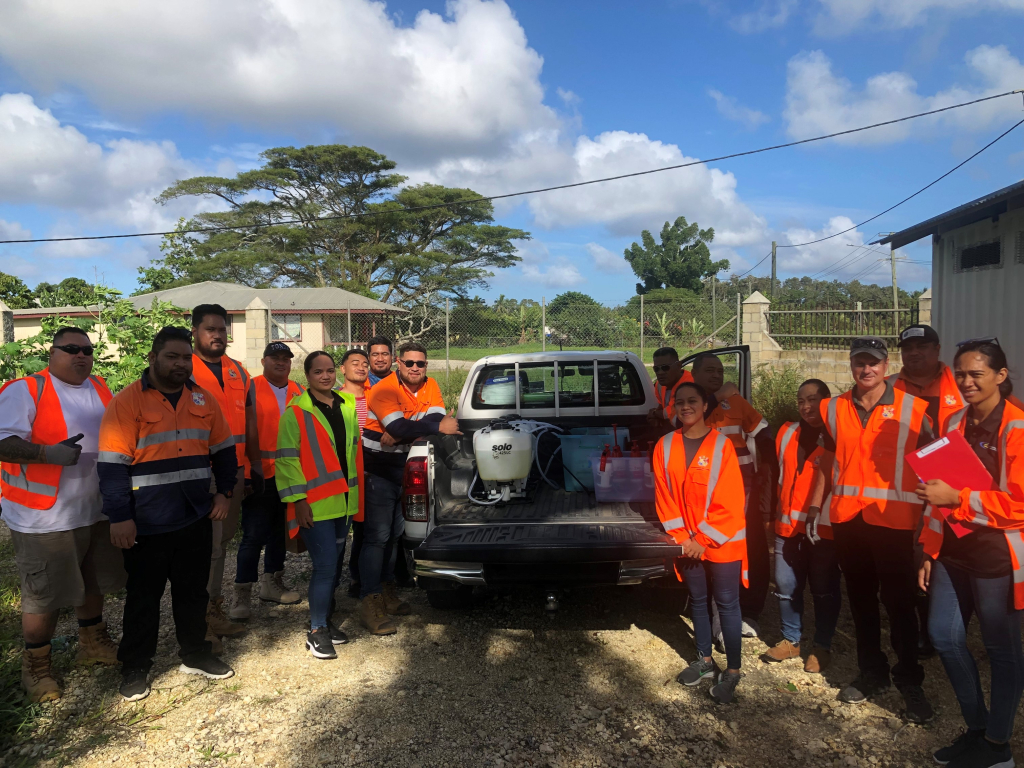Invasive species practitioners in the Kingdom of Tonga have learnt how to conserve biodiversity and manage invasive weeds thanks to training programmes held on 2-3 and 9-10 August 2022.
The Secretariat of the Pacific Regional Environment Programme (SPREP) delivered the training through Global Environment Facility 6 Regional Invasive Species Project (GEF6 RIP) - ‘Strengthening national and regional capacities to reduce the impact of Invasive Alien Species on globally significant biodiversity in the Pacific.
The first training was conducted in Nukualofa for the Tonga Department of Environment staff. This included a site visit to Tonga College Atele, a hot spot for the invasive weed, Panama rubber tree (Castilla ellastica).
The training also allowed the college science students of Tonga College to learn about invasive species and witness a demonstration of managing Panama rubber trees on their school campus.

The same training was delivered in Vava’u for the Department of Environment, Department of Agriculture, and the Vava’u Environment Protection Association (VEPA). Training participants visited Mount Talau, a conservation site managed by the Department of Environment and the Vava’u Environment Protection Association, with the support from SPREP through the GEF 6 RIP. Participants learned about the importance of eradicating priority weeds and managing invasive species in a high-value site to restore its ecosystem functions. Two endemic species can be found on Mount Talau, the Tongan whistler bird, locally known as the hengahenga and the Casaearia buelowii plant.
Tonga Invasive Species Coordinator, Viliami Hakaumoto highlights the importance of these training programmes, “staff across different agencies can be trained on techniques in invasive species management to ensure coordination among agencies and streamlining of approaches.”
Weeds are among the most serious threats to the natural land environments of the Pacific. They displace native species, contribute significantly to land degradation, and reduce agricultural productivity.
After habitat loss, invasive weeds represent one of the biggest threats to Pacific biodiversity. Weeds have the capacity to reproduce in large numbers. These can quickly be dispersed via wind, waterways, people, birds, and other animals. This mass production can threaten the survival of many plants and animals as the weeds compete with native plants for space, nutrients, and sunlight.
Therefore, invasive species practitioners must be trained to manage weeds’ impact on biodiversity and ecosystems. The training programmes allow for practitioners to identify weed species, assess levels of impact and learn of control methods to be used.
GEF 6 Project Manager, Mr Bradley Myer, said: “Training programmes on the ground provide much needed information sharing and operationalised management to reduce the impacts of invasive species on native plants and animals. Without these, there will be continued biodiversity and ecosystem loss.”
In addition to training programmes, there are also supporting resources and tools, such as the Pacific Invasive Species Battler Series guides which assist ongoing invasive species management work in the region. They are available on Battler Resource Base (BRB)
The training programmes are part of the GEF 6 Regional Invasive Project (GEF 6 RIP). The GEF 6 RIP aims to develop and implement comprehensive national and regional invasive species management frameworks that help to reduce the threats from Invasive Species to terrestrial, freshwater, and marine biodiversity in the Pacific.
The GEF 6 RIP is funded by the Global Environment Facility, implemented by the United Nations Environment Programme and executed by the Secretariat of the Pacific Regional Environment Programme.
The Project works primarily in the Marshall Islands, Niue, Tonga, and Tuvalu and has a regional component.
Implementation of the GEF6RIP is supported by the Pacific Regional Invasive Species Management Support Service.
For more information on the GEF 6 RIP, please contact Project Manager GEF 6 RIP Bradley Myer at [email protected].
